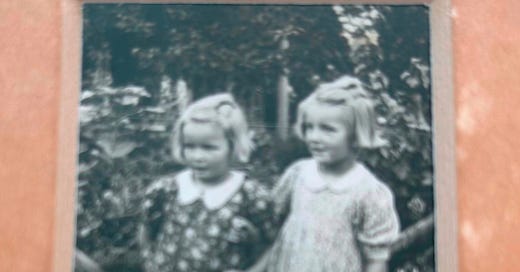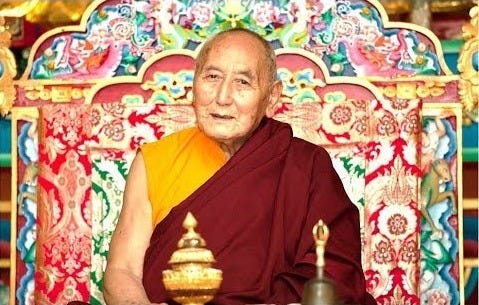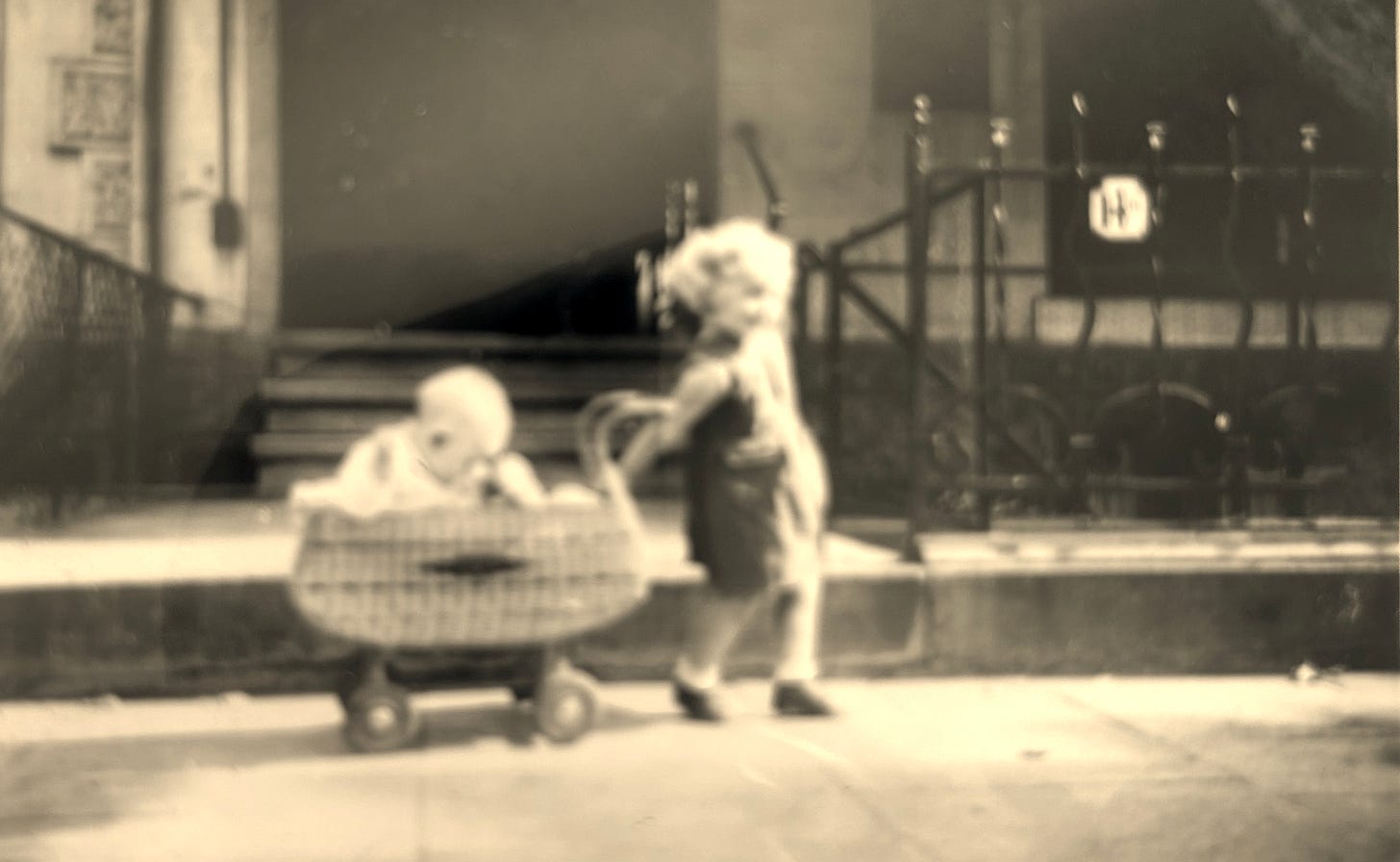My Auntie Ingrid grew up amidst two wars, in a tiny town, with a pig in the backyard. There wasn't much money, if any. She spent countless days racing to the safety of a bomb shelter.
At 16, she boarded a boat to the United States with her 18 year old sister and learned to fend for herself in a new country.
I wish I could tell you my Auntie Ingrid was warm and gentle, but she wasn’t. She had a sharp tongue and an even sharper mind when it came to criticism. But there was beauty in her harshness. She grew the most stunning roses—vibrant, robust, well-defended and delicate. Her pound cake could make you cry. She loved. She cared. It was a rough love and care; but it was genuine.
A few years ago, she met the age of 81 with a terminal illness. Our family sat by her bedside. She was tiny, her blue eyes sparkly. She told me, over and over, that she wasn’t scared.
“I always tried to do the right thing. I was a good person in my life,” she repeated, reassuring herself. Family members stole glances. Someone said,
“Of course, of course” to break the silence.
Seeing her in the bed, knowing she would not be getting out felt suffocating.
How many times had I experienced a strong emotion, and then went for a walk in the woods? How many times had I needed a change of scenery and then went on a day trip to the river? Knowing that Ingrid had to stay right there and face whatever arose, I felt great admiration for her bravery.
I yearned to do something, anything, to help. My mind flashed back to meeting the “Threshold Choir,” a few weeks prior. They were a group of volunteers who sing bedside to those facing death. Sylvia Boorstein, a founder of Spirit Rock Meditation Center, brought them to her Wednesday class. I loved it. Would they come all the way out to Santa Rosa to meet Ingrid and sing for her? There wasn’t much time. I called them. To my surprise, they knocked on her door the next day.
Singing in perfect harmony gently, kindly, they gazed into her eyes like a mother looks at a new child:
You are loved, deeply loved, they sang.
You are a well-cherished garden.
You are loved, deeply loved.
You are a treasured child.
All your life, all your days, from the very first moment of being.
Drink it in, drink it in.
Love is the life-giving water.
Take it in, take it in.
Know it in every cell.
Soak it into your toes, so the rose that you are fully blossoms.
(M.P. Scott © 2004)
Ingrid's face melted, her cheeks now pink and soft. She looked like she was in love, smiling, laying there with arms spread wide, as if to free the heart from physical restriction. She was gentle, innocent, quiet: deeply absorbing the message, its meaning and its truth. Song held up a mirror and she gazed at her own innate beauty, her pure love. I had never seen her like that. She didn’t want it to end.
It occurred to me that this was a completely radical moment in her life. Had she had experienced this kind of nurture before, this much attention and presence? Would she have been able to accept it, had it been offered?
The vulnerability of illness offered space for a surrender to take place, one where she could drop her armor, open up. In this one way, the illness was a kind friend. Just as her life was ending, Ingrid experienced a profound beginning.
Inside of all of us, we have this love and possibility.
War, neglect, poverty, racism, loneliness–all of which Ingrid went through–are examples of the many adversities of modern life on earth. None of these could steal her goodness. This inner essence can’t be created, it can’t die. It is always there, our birthright. When we meditate, we rest in awareness of this treasure that we already have. In meditation, we do our best to realize this truth, to notice it, and come back to it, again and again.
In some ways, Ingrid’s transition was like a meditation retreat, one which removed all of the external distractions of life. As her body slowly faded, she became more and more intimate with her heart essence. It takes courage to face ourselves without distraction, especially for one last time.
Some meditation teachers say that discovering our own innate goodness is like going home. When we get lost in life, we can breathe, pause, turn inward, and go back home.
Have you ever flown in an airplane that just cuts through a storm in the clouds, only to find that the sky is perfectly blue with sun shining? Our home inside the heart is like a beautiful blue sky that exists all the time, although the clouds and storms of life can obscure it.
In daily life, meditation practitioners make an effort to experience and express natural compassion. We wake up every day and purposely arouse a wish for others to be free from suffering. We generate a motivation to help them; we make efforts to be helpful. We send love. We send well wishes. Doing this opens the door to let go of self absorption and ego clinging.
Joan Hailifax , a famous teacher from the Zen tradition, shares that caring for the welfare of others enlivens us. She explains that compassion enhances neural integration, hooking up all different parts of the brain. It also lowers cortisol levels which reduces stress and strengthens our immune system.
Neuroscientist Richie Davidson reports that compassion has even been found to reduce inflammation in the brain, a precursor to dementia.
The research of neuroscientist Tania Singer reveals that compassion activates a network in the brain associated with pleasure and social connection.
It feels right. It feels so good—to be compassionate. I think we all know this deep down.
My teacher, Yangthang Rinpoche, used to say:
Think of how you came into the world as a baby. You were naked, alone, completely vulnerable. Somebody had to feed you, keep you warm, keep you safe, be there when you woke up–you are the recipient of so much love and compassion.
Realizing that we are all deeply interconnected—that we need each other’s love to survive and thrive in this world where we are vulnerable—helps us to practice a generosity of spirit. With this realization, we can also let go of seeing ourselves as an island.
Then, all the individualistic competition and comparison that we are so inclined toward can more easily dissolve into collaborations. When we let go of that which obscures our true nature, or, like my auntie Ingrid, our armoring, we open up to the possibility of living a life filled with love and freedom.
“Love is the only cause of happiness. Its nature is all pervasive like space. Love is the sunlight of the mind.”
—Garchen Rinpoche








Beautiful! I am so happy to receive your posts in my in-box. This is a great way to have access to you and your heart.
well said/written